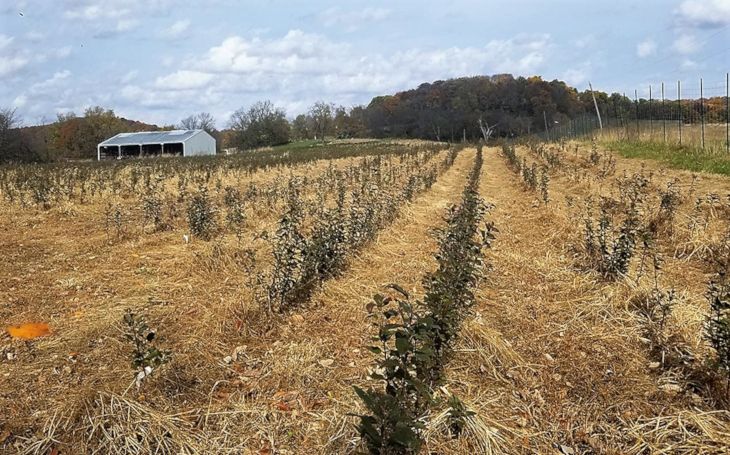Organic Frequently Asked Questions

What is the definition of "organic"?
Here is the definition Merriam-Webster uses to define "organic" as it relates to growing: Produced with the use of feed or fertilizer of plant or animal origin without employment of chemically formulated fertilizers, growth stimulants, antibiotics or pesticides. That is also the standard we go by.
Are your organic trees also non-GMO?
Yes. ALL of our trees are non-GMO, not just the organic trees.
What kind of soil are the organic trees grown in?
Our organic trees are budded by us and planted on the Stark Just-Organics Farm, which is separated by miles from our conventionally-grown tree farms. The Just-Organics Farm has always been pastureland. No synthetic chemical fertilizers, herbicides or pesticides have ever been used there.
What organic sprays do we use?
We sometimes use biological controls, like BT and diatomaceous earth, to control pests that may endanger the crop. We may also use a copper fungicide to address mildew issues. Neem oil is also very effective for both pests and diseases.
Why are organic trees more expensive?
Growing organic trees is very labor-intensive and requires a great deal of hands-on care. Because we don’t use chemical sprays to control weeds and insects, we weed by hand and often pick bugs off of trees by hand. Cover crops must be planted to help fix nitrogen in the soil because we don’t use synthetic fertilizers. Even the farmland itself was much more expensive to purchase because it was so pristine and fertile.
Will organic trees produce fruit in the same amount of time?
If properly cared for, organic trees will bear fruit in yield amounts that are comparable to conventionally grown trees. Cover crops and healthy soil are the keys to good growth in the absence of synthetic fertilizers, which artificially spur growth.
Will a tree live longer if its grown organically?
Presuming the climate, sunlight and water requirements are met, organic trees do tend to live longer because they are grown in soil that is not constantly depleted by the use of synthetical chemicals. Beneficial microorganisms thrive in organic soil, which contribute to the overall health and immune system of the tree. That helps organic trees weather disease problems better, lessening the chance of a disease killing the tree before its natural life span is over.
Will the fruit be of the same quality as a conventionally grown tree, or should the customer expect blemished fruit?
Some organic fruit is not as perfect-looking as grocery store fruit because it is not continually treated with sprays to prevent pests and diseases. If you are vigilant with an organic spraying program, picking off bugs, keeping the soil healthy and buying disease-resistant varieties, you can grow very good looking fruit.
Are these trees going to be shipped differently than our non-organic trees?
All of our organic trees are kept in a completely separate warehouse space, and are handled, boxed and shipped separately, in their own box.
Can a customer order non-organic and organic trees on the same order?
Of course. They will be shipped in separate boxes.
Do we also have organic fertilizers?
Yes, we have a whole line of organic fertilizers:
Do we also have organic sprays for diseases and pest control?
We carry all-natural sprays and biological pest controls:
Does my certified organic tree become nonorganic if it’s exposed to pollen from nearby trees that are not certified organic?
The pollen from the non-organic tree will fertilize the seed of the organic tree, but will not change the genetic makeup of the tree or its fruit - only offspring that may be grown from the seed.
What are the benefits of growing organic vs. non-organic?
- Your Health: No toxic chemicals in your garden shed means no harmful residue on your harvest, or in the local water runoff. Your crops will have more vitamin and mineral content than even organic produce from a supermarket, because it will be fresh picked by you.
- Flavor & Nutrition: Organic fruits and vegetables taste considerably more fresh and juicy because chemicals have a drying effect on growing fruit. They bear little resemblance to grocery-store produce, which is bred for shelf life and not your taste buds. It’s also a lot less expensive to grow your own organic produce.
- Soil Health: Nature-made materials like compost and bone meal act like probiotics for your garden, by breeding beneficial microorganisms that keep the soil in balance. By abandoning pesticides, you’ll save the beneficial insects that prey on not so beneficial insects.
- The Environment: Organic growing protects wildlife and birds from the effects of chemical products. Soil rich in organic matter is less like to erode. Composting to create healthy soil saves landfill space. It’s all about balance.
- Personal Well-Being: Growing and tending your own plants, knowing that this is the best possible, highest quality food on Earth, is incredibly gratifying. In a world of sensory overload, time spent in an organic garden is restorative, restful and a great way to recharge.



